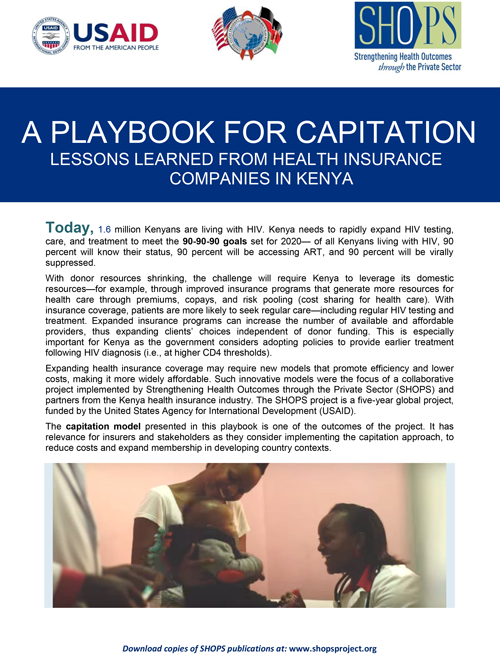
Resource Library
A Playbook for Capitation: Lessons Learned from Health Insurance Companies in Kenya
Today, 1.6 million Kenyans are living with HIV. Kenya needs to rapidly expand HIV testing, care, and treatment to meet the 90-90-90 goals set for 2020— of all Kenyans living with HIV, 90 percent will know their status, 90 percent will be accessing ART, and 90 percent will be virally suppressed.
With donor resources shrinking, the challenge will require Kenya to leverage its domestic resources—for example, through improved insurance programs that generate more resources for health care through premiums, copays, and risk pooling (cost sharing for health care). With insurance coverage, patients are more likely to seek regular care—including regular HIV testing and treatment. Expanded insurance programs can increase the number of available and affordable providers, thus expanding clients’ choices independent of donor funding. This is especially important for Kenya as the government considers adopting policies to provide earlier treatment following HIV diagnosis (i.e., at higher CD4 thresholds).
Expanding health insurance coverage may require new models that promote efficiency and lower costs, making it more widely affordable. Such innovative models were the focus of a collaborative project implemented by Strengthening Health Outcomes through the Private Sector (SHOPS) and partners from the Kenya health insurance industry. The SHOPS project is a five-year global project, funded by the United States Agency for International Development (USAID).
The capitation model presented in this playbook is one of the outcomes of the project. It has relevance for insurers and stakeholders as they consider implementing the capitation approach, to reduce costs and expand membership in developing country contexts.
Resource Type : Report
Country : Kenya
Year : 2016-08-09T10:00:00
Language : English
Project : SHOPS


